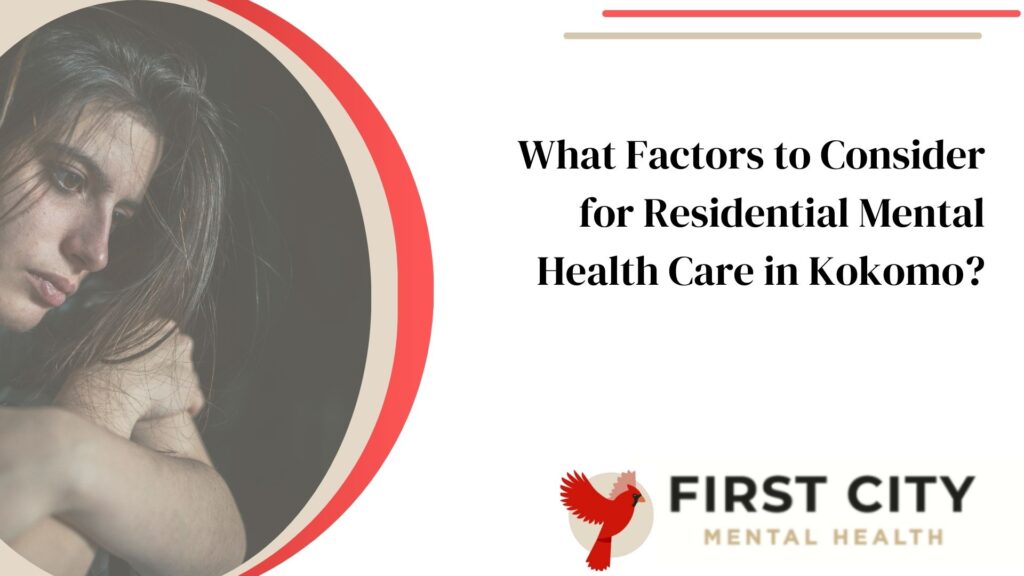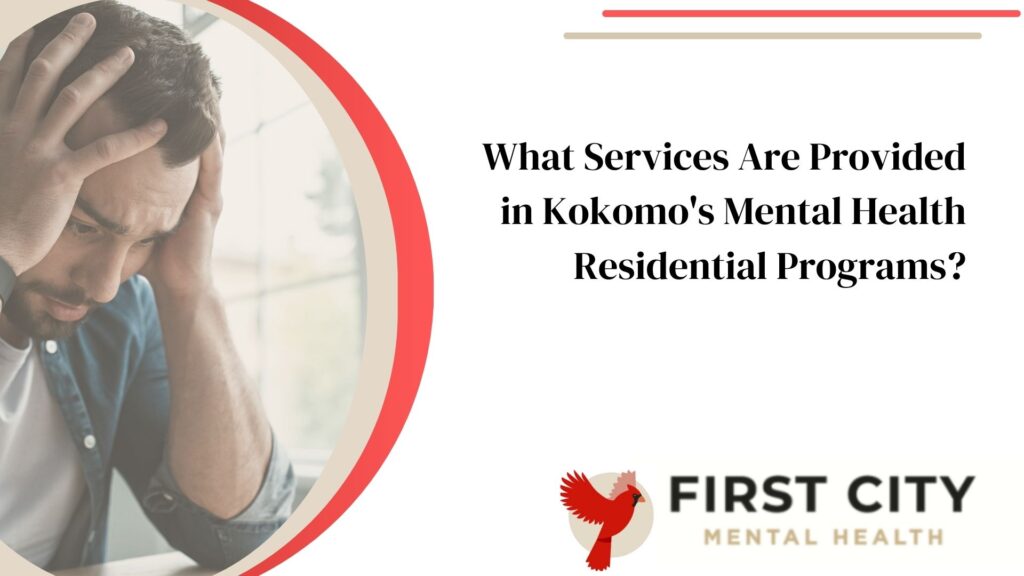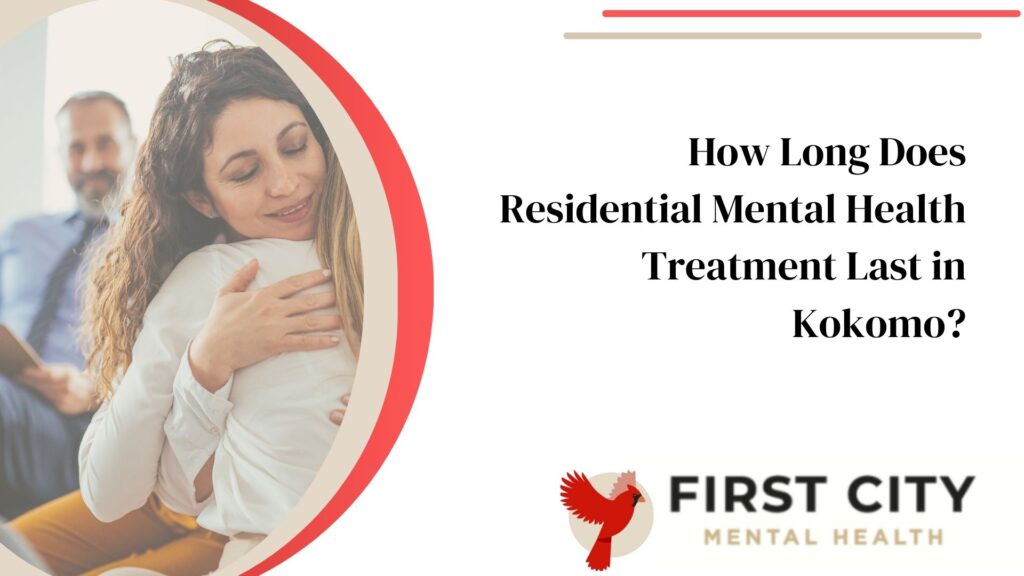
What Services Are Offered in a Mental Health Partial Hospitalization Program?
January 27, 2025
How to Choose a Residential Mental Health Facility in Kokomo?
January 28, 2025Mental health challenges can be overwhelming, whether you’re experiencing them yourself or watching a loved one struggle. When conditions become severe and disrupt daily life, it may be time to consider more intensive care options.
Many people in Kokomo face this dilemma but aren’t sure what mental health residential treatment involves.
Mental health residential treatment programs in Kokomo provide 24/7 support and structured activities for individuals dealing with severe mental illnesses. These programs focus on comprehensive care to help patients manage symptoms and achieve stability.
This article will explain what to expect from a mental health residential treatment program in Kokomo. You’ll learn how these treatments work, factors to consider when choosing a facility, and the services provided.
Read on to learn more about improving your mental well-being or that of someone you love.
Key Takeaways
- Mental health residential treatment in Kokomo provides 24/7 support, structured activities, and individualized treatment plans designed to help patients manage severe mental illnesses.
- Facilities focus on comprehensive care, using individual therapy, group therapy, family involvement programs, and recreational therapy to build life skills for independent living.
- Evaluating the quality of treatment centers involves checking licensing/accreditation, visiting facilities for consultations, speaking with families who have experience there, and reviewing their structured treatment plans.
How Does Mental Health Residential Treatment Work in Kokomo?
Residential mental health Indiana treatment provides a structured and secure environment 24/7. The facilities offer around-the-clock observation and activities, ensuring comprehensive care for several months.
Each resident receives an individualized treatment plan tailored to their specific disorders. This includes individual therapy sessions, group therapy, and family involvement to strengthen support systems.
The programs aim to treat mental health conditions and reintegrate residents with their families. Recreational therapy helps residents develop the life skills needed for independent living.
Medical professionals closely monitor progress and adjust treatments as necessary, creating a safe environment conducive to recovery.
How to Assess Quality in Kokomo’s Residential Mental Health Facilities?
Evaluating the quality of residential mental health facilities in Kokomo involves several key steps. Ensuring a facility meets specific standards can significantly improve treatment outcomes.
- Check Licensing and Accreditation: Verify the center’s licensing with state and federal agencies. Look for accreditation from The Joint Commission or another reputable organization.
- Seek Consultations and Visits: Schedule consultations with potential facilities. Visit them to observe their environment and ask questions about their staff and programs.
- Speak With Families: Talk to families who have experience with the facility. Their insights can provide valuable information about what you can expect.
- Evaluate Structured Treatment Plans: Review the facility’s treatment plans. If necessary, check if they include individual, group, family therapy, and academic support.
- Involvement of Family Components: Effective programs often involve family members in treatment. This can help build healthy relationships and support recovery outside the facility.
Understanding how these factors contribute to a successful mental health residential Indiana treatment program sets a strong foundation for making an informed choice.
What Factors to Consider for Residential Mental Health Care in Kokomo?

Choosing the proper mental health residential in Kokomo requires careful consideration of several factors. Begin by evaluating the severity and type of mental health conditions needing treatment, such as eating disorders or substance use problems.
Look for facilities offering comprehensive assessments and individualized treatment plans to address these issues effectively. Additionally, check if the facility provides a range of therapies, including cognitive-behavioral therapy (CBT), group sessions, and medication management.
Assessing the cost is also crucial since residential programs can be expensive and might not be covered by insurance or Medicaid. Verify what portions of care your insurance covers to avoid unexpected expenses later.
Pay attention to the quality of staff at these facilities; experienced professionals are essential for providing effective psychiatric care and support.
The right environment can make a difference, says Dr. Emily Watson, a psychiatrist specializing in residential mental health services.
Ensure that you choose a facility equipped to manage any co-occurring conditions like self-harm tendencies or severe mood changes through intensive treatment options tailored to individual needs.
Why Choose Mental Health Residential Treatment in Kokomo?
Mental health residential mental health Kokomo offers a higher level of care that outpatient programs often cannot provide. Children and adults with severe mental health issues can benefit from structured, long-term support in a homelike environment.
This sense of community helps clients develop coping skills and reduces feelings of isolation.
Kokomo’s residential facilities are small but high-quality, allowing staff to give personalized attention to each client. Having accurate knowledge about their conditions ensures meaningful guidance for everyone involved.
The four styles of care available also cater to various mental challenges, providing comprehensive behavioral health treatment tailored to individual needs.
When to Expect Results from Residential Mental Health Care in Kokomo?
Residential mental health programs care results in Kokomo vary based on individual needs and treatment plans. Most programs last several months, creating a structured environment that addresses self-harm, substance abuse, and other mental health conditions.
Initial improvements often appear within the first few weeks as residents adjust their daily schedules.
Long-term benefits include better condition management and skills to support a return to the home environment. Success also depends on the quality of care provided at these treatment facilities.
Expect steady progress with comprehensive support designed for long-term recovery goals.
What Services Are Provided in Kokomo’s Mental Health Residential Programs?

Transitioning from when to expect results, it’s time to explore the services provided in Kokomo’s residential mental health treatment programs. Each service is designed to support recovery comprehensively.
- Individual Therapy Sessions: Therapists conduct private sessions to address personal challenges. These sessions allow for focused, personalized care.
- Group Therapy: Facilitated by licensed professionals, group therapy offers peer support and shared experiences. It helps residents tackle common issues together.
- Family Involvement Programs involve family members in the treatment process, strengthening relationships and providing a support network.
- Academic Support: Educational components are integrated to ensure students stay caught up academically. This includes tutoring and structured learning schedules.
- 24/7 Observation and Care: Staff monitor residents around the clock for safety and support. This reduces risks associated with self-harm or substance use disorders.
- Structured Daily Activities: Residents follow a daily schedule that includes therapy, exercise, and recreational activities. These help establish routine and stability.
- Security Measures: Facilities have restricted access for the safety of all residents. This ensures a secure environment conducive to healing.
- Comprehensive Treatment Plans: Individualized treatment plans address unique mental health needs. Regular assessments adjust these plans as necessary.
How to Prepare for Mental Health Residential Treatment in Kokomo?
Preparing for residential treatment for mental health can feel overwhelming. Follow these steps to ensure a smooth transition into a residential facility.
Seek Consultation and Visit the Program
Consult with a mental health professional to discuss your needs. Visit the residential treatment facilities in Kokomo to understand their environment and services.
Research Licensing and Accreditation
Check the licensing and accreditation of the residential treatment centers. This ensures that they meet national standards for quality care.
Speak with Families Who Have Experience
Talk with families whose members have been treated at the facility. Their insights can provide valuable information about what to expect.
Consider Costs and Insurance Coverage Options
Investigate the costs associated with residential care and explore insurance coverage options. Many programs offer financial assistance or payment plans.
Understand the Treatment Approach
Learn about the specific treatment approaches used at the facility. This could include therapy types, medication management, and other support services.
Prepare Personal Items to Bring Along
Pack essential personal items like clothing, toiletries, and comfort items from home. Different facilities have different policies on what you can bring.
Inform Your Support System
Keep your family and friends informed about your stay in a residential treatment facility. Their support is crucial during this time.
Arrange for Time Off Work or School
Plan by arranging time off from work or school if needed. Your healthcare provider may require you to obtain the necessary documentation.
Complete Any Required Assessments or Paperwork
Facilities often require pre-admission assessments or paperwork to be completed beforehand. Ensure all documents are filled out accurately to avoid delays.
Mental Preparation for Residential Care
Mentally prepare yourself for entering residential care by setting goals and focusing on the positive outcomes expected from the treatment program.
How Long Does Residential Mental Health Treatment Last in Kokomo?

The length of residential mental health facilities treatment in Kokomo generally lasts for several months. This period allows enough time to provide long-term care and support for children with severe mental health conditions.
The specific duration can vary based on each child’s unique needs and personalized treatment plans.
Programs in Kokomo aim to equip children with the skills they need to manage their conditions better. These treatments help them deal with issues like self-harm while striving to reunite them with their families.
Various services are available, ensuring that each child receives comprehensive care throughout their stay.
Conclusion
Residents seeking mental health treatment in Kokomo can expect comprehensive care. Facilities provide round-the-clock observation and structured activities, including individual and group therapies.
Family involvement is critical to the treatment plan, ensuring holistic support. Academic programs ensure children don’t fall behind in their studies. Residential mental health facility offers significant benefits for severe cases like self-harm or substance abuse issues.
FAQs
1. What is the average length of a mental health residential treatment program in Kokomo?
The average length of a mental health residential treatment program in Kokomo can vary but typically lasts from 30 to 90 days.
2. How does residential treatment compare to outpatient therapy for self-harm?
Residential treatment provides more intensive support and supervision than outpatient treatment, which helps individuals who struggle with self-harm receive constant care.
3. Are there alternative options to long-term care in these programs?
Yes, in addition to long-term care, other treatment programs include short-term stays and outpatient services that provide support without requiring extended residence.
4. What are some benefits of choosing a mental health residential treatment program in Kokomo?
Choosing a mental health residential treatment program offers many benefits, such as structured daily routines, personalized therapy plans, and access to various therapeutic activities for overall well-being.






